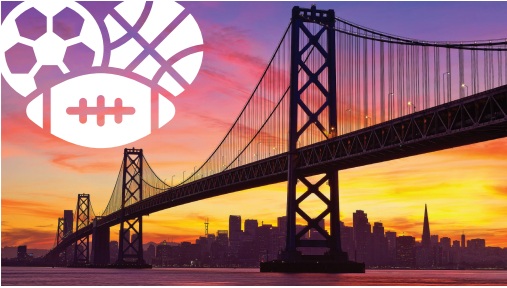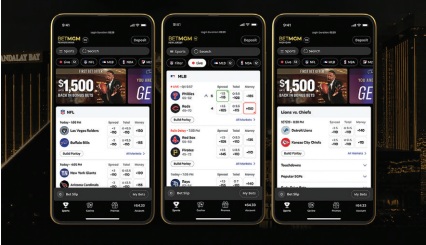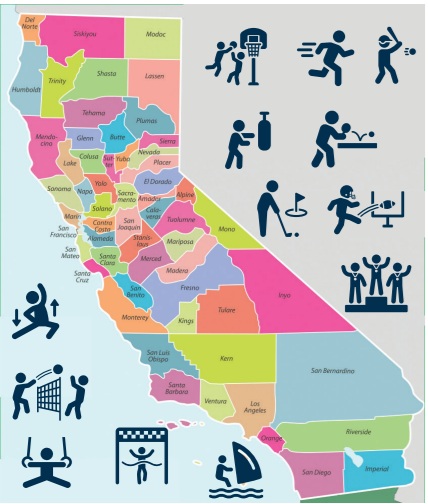CALIFORNIA DREAMING By David McKee
California is the largest untapped sports betting market in the United States and possibly the world. That fact is unlikely to change for the foreseeable future. Certainly not before 2026-
2028.
It’s not for lack of trying that California doesn’t have sportsbooks in existing casinos. There have been several attempts to legalize wagering on sports – ever since 2018 when the U.S. Supreme Court struck down the Professional & Amateur Sports Protection Act (PASPA) of 1992 as unconstitutional. PASPA had effectively limited sports gambling to one state, Nevada. The Supreme Court
opened it up to all the other 49. Since then 38 states have taken that step.

California also doesn’t allow online gaming, and in the everchanging political landscape, often those who want to legalize online gaming want to combine it with online sports betting.
But not always. While that High Court decision led to the biggest expansion of U.S. gaming since Indian Gaming itself was legalized – one as dramatic and chaotic as the Oklahoma Land Rush
– California has in the intervening seven years stood tantalizing and unreachable to eager suitors like BetMGM, Caesars, FanDuel and DraftKings. The failure to launch has been just as frustrating for those inside the state who want to unlock a source of money that other states have ready access to. That includes lawmakers who want to tax the wagers, and gaming tribes who want
to snatch the lucrative prize away from nearby Las Vegas.

The reason why it hasn’t happened yet: The biggest tribal gaming players among the 73 or so total gaming operators can’t agree on what they want a sports betting landscape to look like. Any proposal must have their blessing or it won’t fly. This has been demonstrated several times, most recently in 2022. Plus, some of them fear that letting the camel’s nose of online gambling into the tent will discourage people from physically visiting their brick and mortar casinos.

So the most recent tribe-backed initiative would have allowed retail sports betting only. Currently the only sports betting that is allowed in the nation’s most populous state with its nearly 40
million people is horse racing and daily fantasy sports. DFS companies, such as FanDuel and Draftkings, of course, want to run sportsbooks like they do in several U.S. states that have
legalized sports betting.
This has also led to the rise of the “social casino” in the Golden State – where online casinos such as Chumba Casino and Pulsz California have proliferated in the last five years. Californians get bombarded regularly by ads for such casinos.
These websites provide free casino play and opportunities for cash prizes, without violating the Golden State’s laws against online gaming. More importantly, they have also planted the seed of gambling on mobile platforms, even if typically no money changes hands.

Shortly after the Supreme Court’s 2018 ruling, a California lawmaker, Assemblyman Adam Gray, who had been waiting years for this opportunity, introduced a state constitutional amendment, ACA 18—but that effort failed. Gray, with state Senator Bill Dodd tried again in 2019 with another constitutional amendment that would have required two-thirds of the Legislature to put it on the 2020 ballot. That too failed.
In November 2019, 18 gaming tribes filed an initiative petition for the California Sports Wagering Regulation & Unlawful Gambling Enforcement Act. This would have legalized retail sports betting and taxed it at 10 percent.The global Covid pandemic hit the U.S. early the next year – derailing any further efforts for a few years.
This was most un-fortuitous for the group of tribes known as the Coalition to Authorize Regulated Sports Wagering – who had gotten the go-ahead on January 22 to begin collecting signatures to put another measure on the 2020 ballot.
They included several of the largest gaming tribes in the state: Rincon Band of Luiseño Indians, Wilton Rancheria, the Federated Indians of Graton Rancheria and the San Manuel Band of Mission Indians. The near-lockdown of the state hobbled their efforts, and they weren’t able to meet their deadline to gather the requisite one million signatures. They sued the state and ultimately the deadline to gather signatures was extended to October 12. Another lawsuit resulted in another extended deadline: December 14. Finally the tribes submitted 1.4 million signatures to approve for the 2022 ballot.

This allowed the California Sports Wagering Regulation & Unlawful Gambling Enforcement Act to appear on the November 2022 ballot as Proposition 26. Proposition 26 would have only have allowed retail sports betting, because of the previously noted fear that online sports betting would drain bodies away from land-based casinos.
Proposition 27 was proposed by out-of-state gambling companies, such as leading sportsbooks BetMGM, FanDuel and DraftKings, who wanted to jimmy open the tightly held tribal gaming market and wedge themselves in. Even though the initiative would have allowed tribes to host sportsbooks at their casinos, the tribes opposed anyone but them having that much control.
The year 2022 wasn’t a good one for sports betting. Both propositions were at swords’ points with each other and both were ultimately unpopular with the voters. If Proposition 26 didn’t spark
Californians’ enthusiasm, with “No” receiving 70 percent, Proposition 27 failed by even worse numbers: 83 percent voted No.
Both sides spent a total of nearly $500 million to play to a draw. It was an expensive lesson. The takeaway from this is that nothing is going to happen in California that the biggest casino
tribes don’t enthusiastically support.

But even that would have to be sold to the voters, who don’t automatically support gaming tribes, although that is usually – ahem – the way to bet. Tribes do generally prefer legalizing
retail sports betting ahead of legalizing online sportsbooks or even mobile apps. Even though it has been demonstrated in state after state that online sportsbooks are way more
profitable. A significant milepost in sports betting that could have a big impact in California came June, 2024 when the Supreme Court declined to hear an appeal to the D.C. Circuit Court of
Appeals’ rejection to challenge to a tribal state gaming compact between Florida and the Seminole Tribe of Florida. This compact allows the tribe to offer online sports betting throughout the entire state – not just at the tribe’s casino on Indian lands.
This would allow a bettor with a mobile device anywhere in the state to make a wager with a casino based on a reservation. That means it would be legal to do so in California too, providing gaming tribes were able to negotiate such compacts. The Appeals Court ruled that gaming compacts could take in a “multitude of topics” related to Class III gaming and that ultimately a tribe’s
online gaming couldn’t be limited to just Indian lands.

California’s gaming tribes have made it clear that they – not outside sports betting interests – intend to keep hold of the steering wheel when it comes to setting the standards for sports betting
October 8, 2024, speaking on a Global Gaming Expo panel entitled “Tribal Sovereignty and Sports Betting: A Delicate Balance,” James Siva, chairman of the California Nations Indian Gaming Association (CNIGA), and vice chairman of the Morongo Band of Mission Indians gave his best guess as to when a sports betting initiative that most of the tribes can get behind would be introduced.
“Maybe 2026, but probably 2028,” he said.
Siva added, “There was a lot of exhaustion” after the 2022 defeat. He continued, “I was exhausted and a lot of California leaders in this room were exhausted, but we never stopped talking about sports betting. At every CNIGA meeting, we were laying out a game plan. Everyone said maybe we should take a pause. We will take off an election cycle in 2024 and keep working on this.” He added, “We’re already looking down the road.” Given the fate of previous sports betting initiatives, that road could be a long and winding one.




















